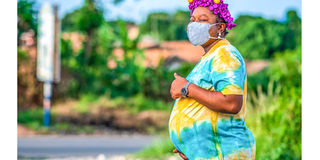Improving the well-being of mother and child in Kenya
Sponsored by Marie Stopes Kenya

Background Information
Improving the well-being of mothers, infants, and children is an important public health goal in Kenya. The Kenya Health Policy 2012-2030 advocates for equitable provision of health care, and Policy Objective 4 provides for the provision of health services in an equitable manner.
In Kenya, maternal mortality rate (MMR) is 362 deaths per every 100,000 live births per year, while the perinatal mortality rate (PMR) is estimated to be 29 deaths per 1,000 pregnancies (KDHS 2014). Both MMR and PMR are major public health problems in many low and middle-income countries (LMICs) like Kenya.
The good news is that globally, the leading causes of maternal and perinatal deaths are known and are, in most cases, preventable through effective, low-cost interventions.
Avoidance of maternal deaths and birth loss begins with prevention. This can be realised by encouraging all women to attend antenatal care (ANC) clinics once they confirm their pregnancy. ANC can be defined as health care for the pregnant woman from conception to the onset of labour.
Good antenatal care aims to make sure that pregnancy causes no harm to the mother and that the developing baby is healthy. Mothers are encouraged to visit a health facility as soon as they learn that they are pregnant. This is usually comprised of at least four hospital visits or more, depending on the mother’s condition.
During the ANC visits, safe motherhood can be achieved through the identification of risk factors from the current and/or previous obstetric history, thorough screening to identify potential complications and health conditions that can affect the mother and foetus, and through educating the mother on the nutrition and pregnancy danger signs, e.g., visual disturbances, headache, seizures, excessive bleeding, foul-smelling discharge, fever, emotional instability, and more.
The following are some of the leading causes of maternal death:

Accessibility to affordable healthcare services has been a major contributor to maternal deaths. However, there have been concerted efforts by various stakeholders, e.g, the Government of Kenya, faith-based organisations, private health facilities, NGOs, and humanitarian organisations, to make maternal health services available and affordable to all.
The Government of Kenya adopted universal health coverage (UHC) as one of the Big Four national priority agenda, with an aspiration that by 2022, all persons in Kenya will be able to use the essential services they need for their health and wellbeing through a single unified benefit package, without the risk of financial catastrophe.
UHC, therefore, has been adopted as Target 3.8 of the Sustainable Development Goals (SDGs), with a clear objective of ensuring that individuals and communities receive the health services they need without suffering financial hardship. This includes provision of essential, quality health services, from promotion to prevention; and treatment, rehabilitation, and palliative care. Progress in the pursuit of UHC will imply advancement toward other health-related targets and take the nation closer to equity and social inclusion.
Hence, in September 2021, Marie Stopes Kenya embarked on a mission to expand its maternal health services coverage, and opened two new maternity units, i.e., Marie Stopes Kisumu and Mombasa maternity nursing homes; a direct contribution to sustainable development goals targets to reduce maternal mortality worldwide to under 70 maternal deaths per 100,000 live births over the period 2016-2030 (UN General Assembly 2015).
The first mother to deliver at Marie Stopes Kisumu Nursing Home had the following to say: “I was a new resident of Kisumu having recently relocated due to a job opportunity. I later met a lady, who provided me with information about the clinic and I became very interested. My labour pains began on a Saturday morning and my husband drove me to Marie Stopes Kisumu Nursing Home, where I delivered a bouncing baby girl. I received a warm reception. I was treated with a lot care and given attention like a VIP. I liked the place very much. Everyone was smiling and I wished to stay at the clinic for longer. The delivery service was quite affordable and I later on referred two of my friends for delivery services.”
Apart from Marie Stopes Kisumu and Mombasa maternity and nursing homes, Marie Stopes Kenya has been operating the Eastleigh Maternity and Nursing Home since 1990. Marie Stopes Eastleigh Nursing Home is a Comprehensive Emergency Obstetrics and Newborn Care (CEmONC) facility equipped with an operation theatre.
References:
WHO. Maternal and Perinatal Health. WHO. 2017.
Lawn J; Kerber K. Opportunities for Africa's Newborns: Practical Data Policy and Programmatic Support for Newborn Care in Africa.
UNICEF. Committing to Child Survival: A Promise Renewed. Progress report 2013.
Gilson L. Health Policy and System Research: A Methodology Reader. 2012.
MSI Reproductive Choices Guidelines for Obstetric Care v2.0.
USAID. Measure Evaluation Population and Reproductive Health, Perinatal Mortality Rate. https://www.measureevaluation.org/prh/rh_indicators/womens-health/nb/perinatal-mortality-ratepmr. Accessed Aug 2014.
KDHS 2014.
Kenya UHC Policy brief.

